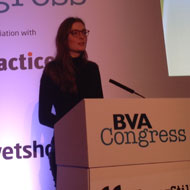What will we need from tomorrow's vets?

Hannah Mason speaking at London Vet Show.
"When we are trying to fix something, we should take a step back and look at what we are trying to prepare students to do," said Hannah Mason, senior vice-president of the Association of Veterinary Students, speaking at the BVA Congress in London. "There is too much emphasis on specialisms and students are not exposed to sufficient practical, bread-and-butter, first-opinion practice," she added.
Hannah felt there should be more emphasis on 'soft skills' – empathy, communication, for example – and better information on the nitty gritty of everyday veterinary practice. Perhaps too, there should be more recognition of transferrable skills that potential veterinary students/surgeons have learnt much earlier in their lives?
Although there is some truth in the necessity to be more careful in the selection of students with a realistic expectation of what general practice represents, is also important to provide the training and support to help students who are selected and who do subsequently struggle with the stresses of veterinary practice.
"The challenges facing the veterinary profession are very similar to those affecting human GPs," said human medical generalist, Dr Joanne Reeve.
She referred to research that showed that a very high proportion of the human population is dependent on multiple medication prescribed to deal with long-term clinical conditions. Many people take more than five different medicines per day and complain that this is burdensome and is in itself becoming 'the problem'.
There is a groundswell in human medicine to revitalise the role of the general practitioners and to rebalance the growing imbalance between GPs and specialists. General practice should be restored to its rightful position.
Joanne challenged the current headlong trend towards the concept of evidence-based medicine in that it places professional opinion and judgement at the bottom of the standard hierarchical pyramid model of knowledge. The latter should be much higher up – maybe to the top of the pyramid.
She emphasised the necessity to develop a much more flexible approach. "It is not what you know, but how you use it," she said. There is a need to recognise the value (and intellectual challenge) of implementing professional opinion, based on experience – with confidence and without fear of retribution.
"We need to reimagine general practice," said Joanne "and build in 'head space' to allow general practitioners to not only spend more time with patients, but also to have time to perform the intellectual process of selecting and applying knowledge."



 The latest
The latest